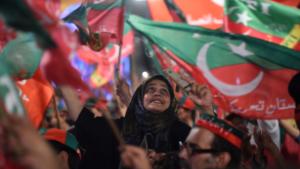Voting begins in Pakistan's most consequential election in years
Islamabad, Pakistan (CNN)Pakistanis have started voting in polls amid heavy security with the party of former cricket star Imran Khan pitted in a hotly contested election against that of jailed former premier Nawaz Sharif.
Police and military personnel were out in force at polling stations across the country, with security officials flying surveillance drones in the troubled northwest city of Peshawar. Long lines of voters queued in the major cities of Karachi, Quetta and Peshawar.
A huge security operation was launched after earlier election violence left dozens dead -- including 150 people killed by a suicide bombing in Balochistan which targeted a political candidate and led to suggestions the vote could be delayed in order to get the situation under control.
This week's election is only the second time in Pakistan's 71-year history that the country has seen a democratic transition of power.
Key timings
8am local (11pm ET Tue): Polls opened
6pm (9am ET): Polls close (could be extended to 7pm/10am if large turnout or delays in voting)
8-9pm (11am - 12pm ET): Election Commission of Pakistan to begin announcing regional results
11pm onwards (2pm ET): General results should start coming into shape, candidates may begin conceding or declaring victory
Security concerns
Army officials said more than 370,000 troops will be deployed Wednesday to ensure a "fair and free" election, with police saying the total security force will include about 800,000 personnel.
The Human Rights Commission of Pakistan (HRCP) has expressed "serious reservations about the extraordinary powers accorded to security forces" and called the election "the dirtiest" in the country's history.
Nearly 106 million people are registered to vote for members of the lower house of parliament and four provincial assemblies.
The run-up to the vote has been dogged by increasing tensions over allegations that the country's powerful military has secretly backed Khan, a massive crackdown on the media and the electoral participation of militant groups.
The military has ruled the country indirectly or directly for much of its 71-year history and retains tight control over defense and foreign policy, as well as its own business empire.
Khan has repeatedly denied claims he is supported by the military, and condemned the harassment of election candidates.
Pakistan election: Who is likely to be the country's next leader?
Tight race
Pakistan has a wide array of smaller parties that could assume a new level of importance if Khan or another candidate needs to rely on them to form a coalition government. In among these fringe groups are some far-right Islamist parties, including some known to be sympathetic to militant groups.
With Sharif's incumbent Pakistan Muslim League-Nawaz (PML-N) still on the back foot after his imprisonment, the election represents a real chance for Khan's center-right Pakistan Tehreek-e-Insaf (PTI) to break into the two-party system which has traditionally dominated national politics.
The final result may go down to the wire however, leaving candidates in coalition negotiations with the once dominant Pakistan People's Party (PPP), led by the 29-year-old Bilawal Bhutto Zardari, son of former President Asif Ali Zardari and Prime Minister Benazir Bhutto.
"It's been quite some time since Pakistan's political environment has been this fraught and polarized, so I imagine that any coalition will be fractious and divided," said Michael Kugelman, a South Asia expert at the US-based Wilson Center.
Khan has built on his sporting celebrity and the PTI's success as a regional party to emerge as a change candidate, attracting religious conservatives and drilling down on Pakistan's endemic corruption -- a task made easier by Sharif's conviction.
Some analysts say however that he lacks the national-level political experience to enact any meaningful reform, and will be hampered by less than loyal allies in his party and the influence of the military.
All eyes will be on whether Sharif's brother, Shahbaz, can maintain the PML-N's grip on its stronghold in Punjab, Pakistan's most populous and richest province. It will be exceedingly difficult for Khan to take power without winning Punjab. Analysts were divided over whether Sharif's jailing would generate a sympathy vote.
Whoever forms the next government will shape the geopolitical future of Pakistan, an Islamic republic of 207 million people, for years to come. The nuclear-armed state faces uncertainty over its relationships with the US, which has cut military aid due to Islamabad's alleged support for the Taliban in neighboring Afghanistan, and China, which has financed multi-billion-dollar infrastructure projects in the South Asian country.
News Courtesy: www.cnn.com











